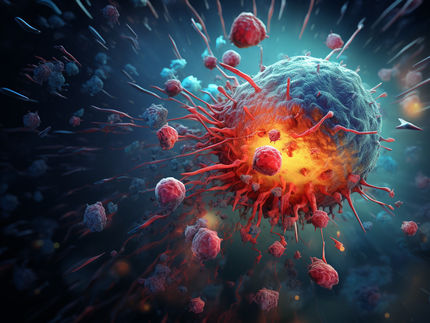Insight into HIV immunity may lead to vaccine
Latest insights into immunity to HIV could help to develop a vaccine to build antibodies' defences against the disease, a University of Melbourne, Australia study has found.
By investigating the action of the human antibodies called ADCC, in people with HIV, researchers were able to identify that the virus evolves to evade or 'escape' the antibodies.
Professor Stephen Kent of the University of Melbourne and one of the senior authors on the paper said ADCC antibodies have been strongly implicated in protection from HIV in several vaccine trials but their action was poorly understood.
"These results show what a slippery customer the HIV virus is, but also shows that these ADCC antibodies are really forcing the virus into changing, in ways that cause it to be weaker," he said.
"It also implies that if good ADCC antibodies were available prior to infection, via a vaccine, we might be able to stop the virus taking hold. This is the holy grail."
The group at the University of Melbourne's Department of Microbiology and Immunology analysed blood samples of people with HIV and found their virus had evolved to evade or 'escape' the ADCC antibodies against HIV they are making to try to control their virus.
The team led by Dr Ivan Stratov and Professor Kent employed a novel technology developed in their laboratory to find where ADCC antibodies were attacking the virus. They then looked at how the sequence of the virus had mutated over time to avoid the immune response.
"There is an urgent need to identify effective immunity to HIV and our studies suggest ADCC responses supply significant immune pressure on the virus," Dr Ivan Stratov, a clinician and researcher said.
The group is now working on designing HIV vaccines to induce ADCC antibodies that make it more difficult for the virus to escape.
The work was published in PNAS.
Most read news
Other news from the department science

Get the life science industry in your inbox
By submitting this form you agree that LUMITOS AG will send you the newsletter(s) selected above by email. Your data will not be passed on to third parties. Your data will be stored and processed in accordance with our data protection regulations. LUMITOS may contact you by email for the purpose of advertising or market and opinion surveys. You can revoke your consent at any time without giving reasons to LUMITOS AG, Ernst-Augustin-Str. 2, 12489 Berlin, Germany or by e-mail at revoke@lumitos.com with effect for the future. In addition, each email contains a link to unsubscribe from the corresponding newsletter.
Most read news
More news from our other portals
See the theme worlds for related content
Topic world Antibodies
Antibodies are specialized molecules of our immune system that can specifically recognize and neutralize pathogens or foreign substances. Antibody research in biotech and pharma has recognized this natural defense potential and is working intensively to make it therapeutically useful. From monoclonal antibodies used against cancer or autoimmune diseases to antibody-drug conjugates that specifically transport drugs to disease cells - the possibilities are enormous

Topic world Antibodies
Antibodies are specialized molecules of our immune system that can specifically recognize and neutralize pathogens or foreign substances. Antibody research in biotech and pharma has recognized this natural defense potential and is working intensively to make it therapeutically useful. From monoclonal antibodies used against cancer or autoimmune diseases to antibody-drug conjugates that specifically transport drugs to disease cells - the possibilities are enormous
Last viewed contents

OrganoTherapeutics SARL - Esch-sur-Alzette, Luxembourg
Study finds breast and ovarian cancer may have similar origins
Evonik ends cooperation with Chr. Hansen
Category:Female_sexual_dysfunction_drugs

Frederick W. Alt and David G. Schatz to be awarded the 2023 Paul Ehrlich and Ludwig Darmstaedter Prize - Laureates raised knowledge of the development of the immune system to a new level
Chemotherapy timing is key to success - Nanoparticles that stagger delivery of 2 drugs knock out aggressive tumors in mice

Call for Entries: Eppendorf & Science Prize for Neurobiology 2017
























































